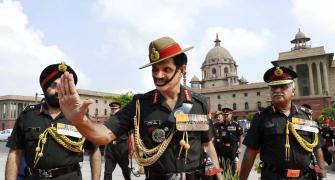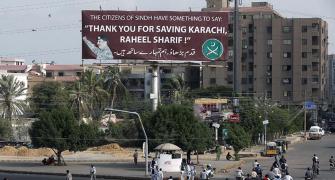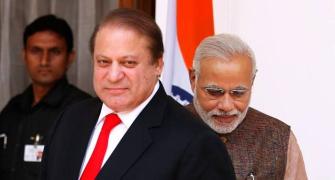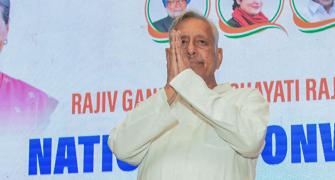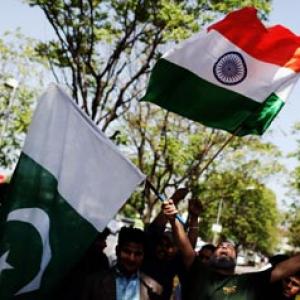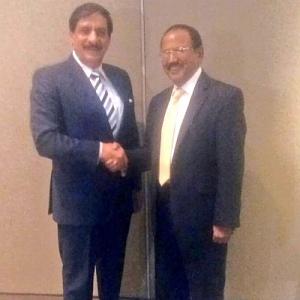'The public has unfair expectations from Mrs Swaraj who is in Islamabad primarily for the Heart of Asia Conference. To restore India's position among stakeholders on Afghanistan is a fair one, but to expect her to do more on the Indo-Pak front without requisite preparatory work is unrealistic,' says Lieutenant General Syed Ata Hasnain (retd).
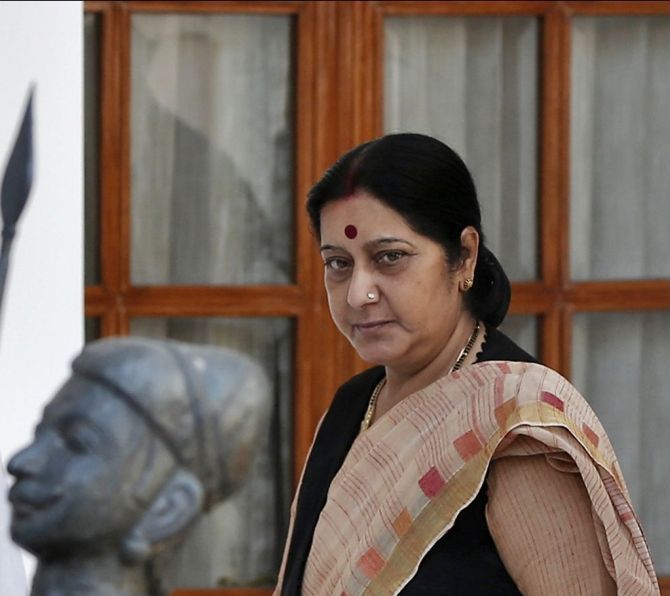
The temptation to write for Rediff on the first day of an event such as the Bangkok talks is akin to the first day first show temptation of a Friday released Bollywood magnum opus. It has to be resisted. Even more there has to be resistance to linking up too many things happening in the strategic world as I am mostly wont to do.
To keep it simple, I am taking up just the single event -- the NSA talks at Bangkok and examining why they could suddenly took place after all the deferments of earlier Indo-Pak engagements in the last few years. Did anything change drastically? Why the secrecy? Did it defy norms of information to Parliament when it was in session?
The Ufa agenda is well known as is the fact that it excluded Jammu and Kashmir and concentrated on terrorism and security-related issues. Pakistan hedged and found old excuses such as consultation with the Hurriyat Conference because it had made an error of judgment about non-inclusion of J&K.
India tactically resisted knowing that without J&K, Pakistan would not budge. These are games nations play after establishing certain red lines. Pakistan's red line was inclusion of J&K and India's was exclusion of any consultation with the Hurriyat.
How was the impasse overcome in terms of agenda and symbolics? Simply by shifting the venue to a third location away from the subcontinent and including J&K in the agenda. Two tricky aspects had to be overcome.
One, Sushma Swaraj had once clearly indicated that no third location would ever be considered, so it was a breach of a recent restriction. It could always be explained away as prudence dictating a minor compromise.
Two was the inclusion of J&K, as against the Ufa agenda. By only discussing the security-related aspects such as infiltration into the Kashmir valley and trans LoC firing exchanges and not even touching Siachen, Sir Creek or political issues regarding territory or separatism, the J&K part of the agenda was clearly acceptable to India.
To the criticism that it was a flip flop which the government was committing ever since it came into power I stated in a television debate that a better term would be 'fits and starts' and that was clearly acceptable in diplomacy when issues are still at the tactical stages of discussion.
Once a comprehensive dialogue has progressed and becomes strategic there can be no more changes possible as done in the tactical domain. The Opposition, of course, must fight and put pressure to minimise tactical changes and gain consistency by the government. So no one is really wrong here.
Apart from the main Ufa agenda which was largely discussed at Bangkok it was the appointment of Lieutenant General Naseer Janjua as Pakistan's NSA only a month or so ago which encouraged India to accept the talks.
Ordinarily, India would have preferred excluding the military so as to give greater legitimacy to civilian leaders but such is the power of the Pakistan military that India feels compulsorily drawn to speaking with it directly to have better insights into the minds of decision makers. The US also appears to be doing the same.
How does one explain the climb down of the government from the high demand of no talks without dismantling of the terror infrastructure and grid and even the feasibility of cricketing ties?
While I completely back the earlier decision on no cricket unless something more definitive moves on the political and diplomatic fronts, I do tend to support talks to discuss security itself, including terrorism.
This was very much on the Ufa agenda. These talks are still tactical and nothing is being given away. Cricket on the other hands raises false hopes and emotions and should only commence when a clear comprehensive dialogue starts.
A good question dong the rounds relates to how a 160 second meeting of the two PMs could translate into talks so quickly. There are some unsaid things here which never need to be flogged. I have no doubt that good diplomatic establishments do some talking on landlines and have a few unpublicised visits; nothing wrong with that.
The talks were being discussed over a period of time since the last collapse in early September. In the interim came the Paris attacks and prior to that the Syrian refugee crisis in Europe. Both these events have sent shivers down the spines of European capitals. Suddenly Western lifestyles are endangered and terrorism is paralysing European society as much as the US homeland felt threatened after 9/11.
Taking the leadership, Western powers are looking at avenues to stabilise other potential areas of discord which have the potential of going Syria's way. The India-Pakistan stand-off does not come into that category, but improvement in the strategic environment would definitely assist in lessening tensions and stabilising one area on which the world has its secondary focus, Afghanistan.
That country can give Syria a run for its money in terms of security threats and potential for instability. We may not be wrong in surmising that the Bangkok talks came in the wake of the visit of General Raheel Sharif's visit to the US where he was categorically told that Pakistan would have to take India on board for the stabilisation of Afghanistan President Ashraf Ghani's strategic alteration having returned towards favouring India.
The Indian minister for external affairs is in Pakistan for an important event, the Heart of Asia Conference under the Istanbul Process. 14 core regional countries including India, China, Russia, Pakistan, Saudi Arabia and Iran form this group with 17 more countries from the West and Japan supporting it.
The public has unfair expectations from Mrs Swaraj who is in Islamabad primarily for the Heart of Asia Conference. To restore India's position among stakeholders on Afghanistan is a fair one but to expect her to do more on the Indo-Pak front without requisite preparatory work is unrealistic.
There will be events of bilateral nature on the sidelines, but Mrs Swaraj will have to be careful not to give away anything, even gestures because everything will be under media glare; that hardly produces results.
The Bangkok talks were an enabler for more things to come. It was a good political reconnaissance which is best done under wraps with requisite revelation at the appropriate time. That is why it did not need to be cleared by or informed to Parliament. Its Joint Statement was issued immediately on conclusion and the secrecy remained in place only until the meeting commenced. Perhaps there is a lesson in this for diplomats across the board.
Lieutenant General Syed Ata Hasnain (retd) is a former General Officer Commanding of the Srinagar-based 15 Corps, now associated as a senior analyst with the Vivekanand International Foundation and the Delhi Policy Group.

